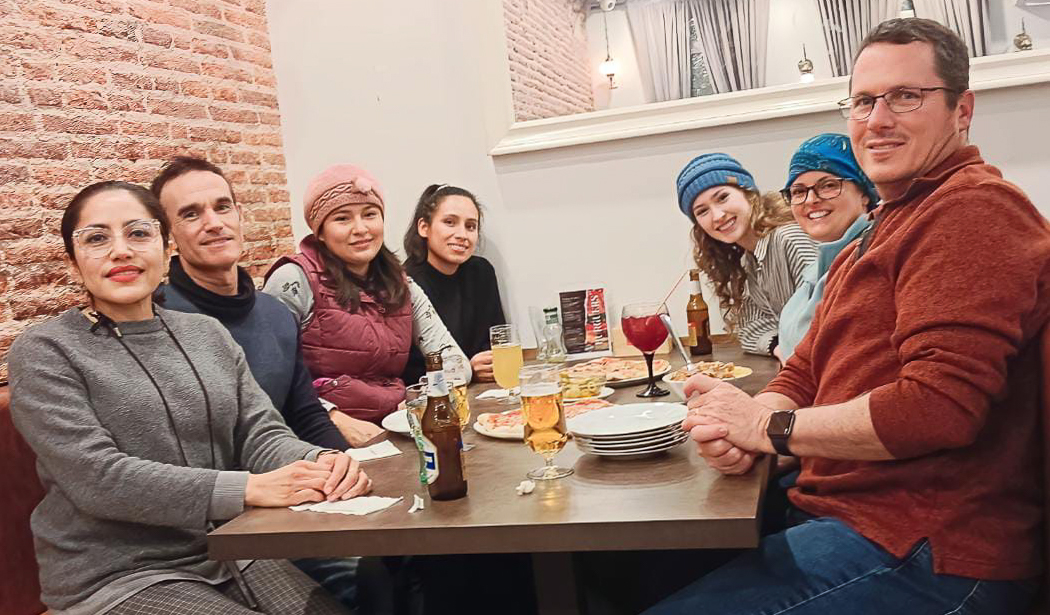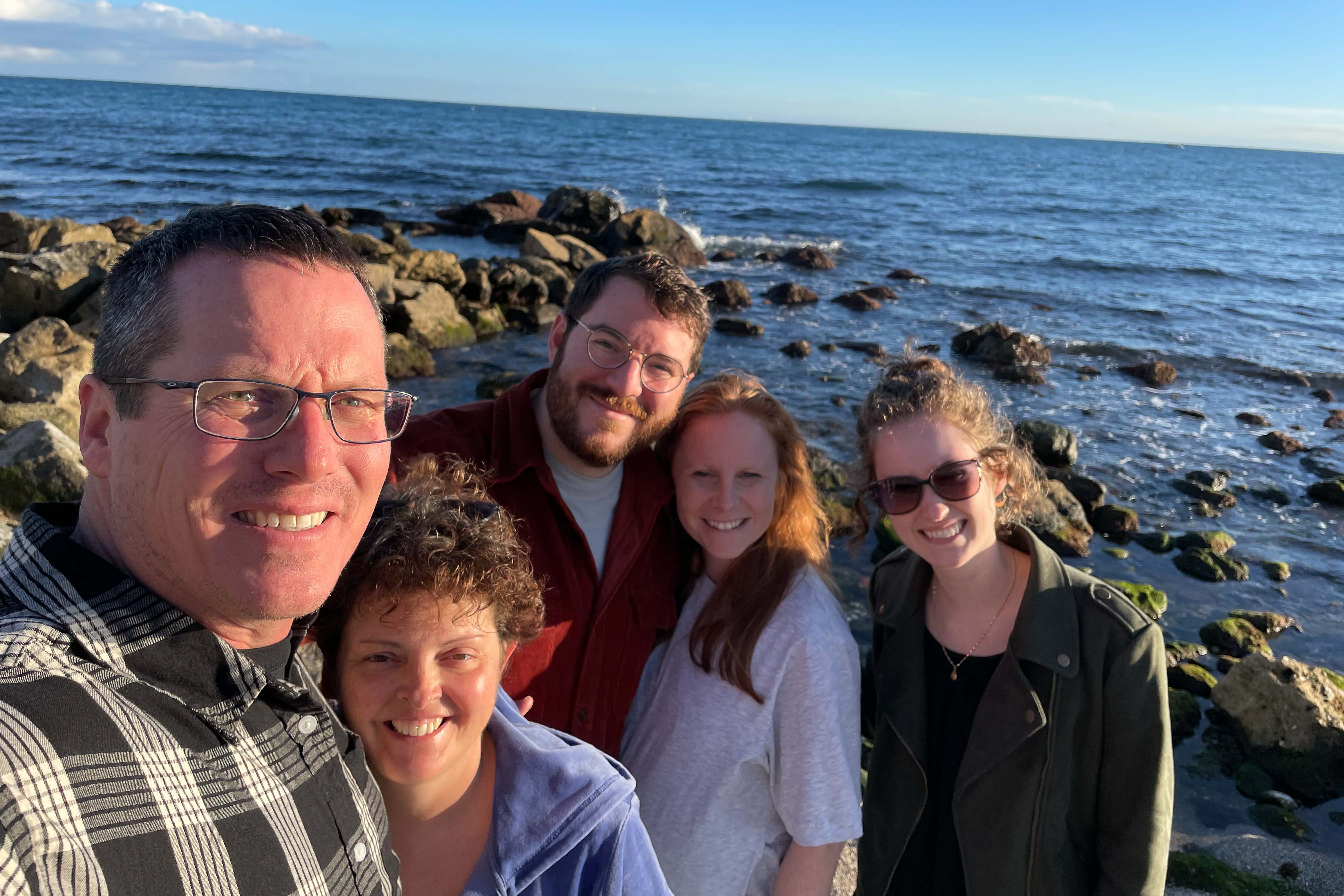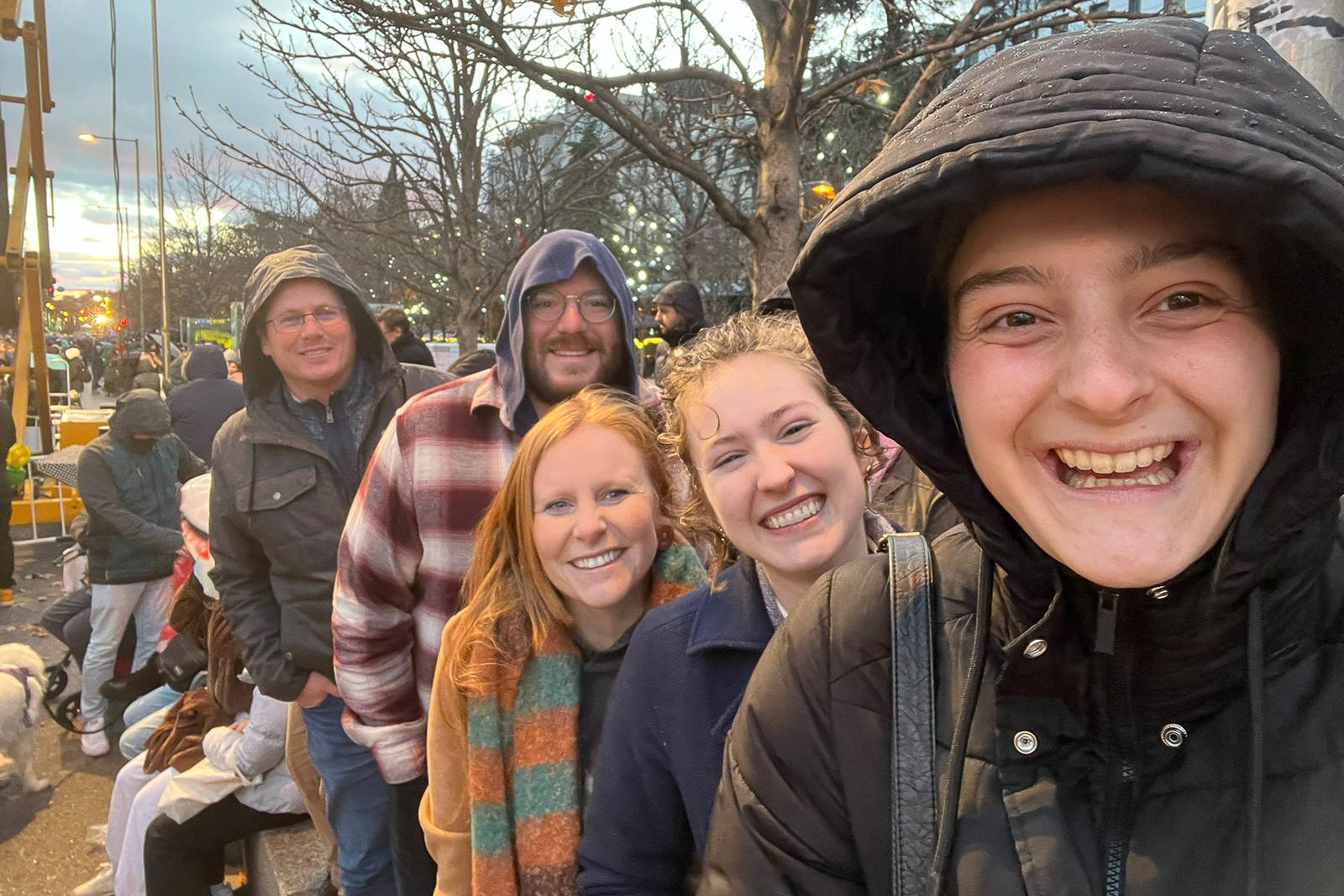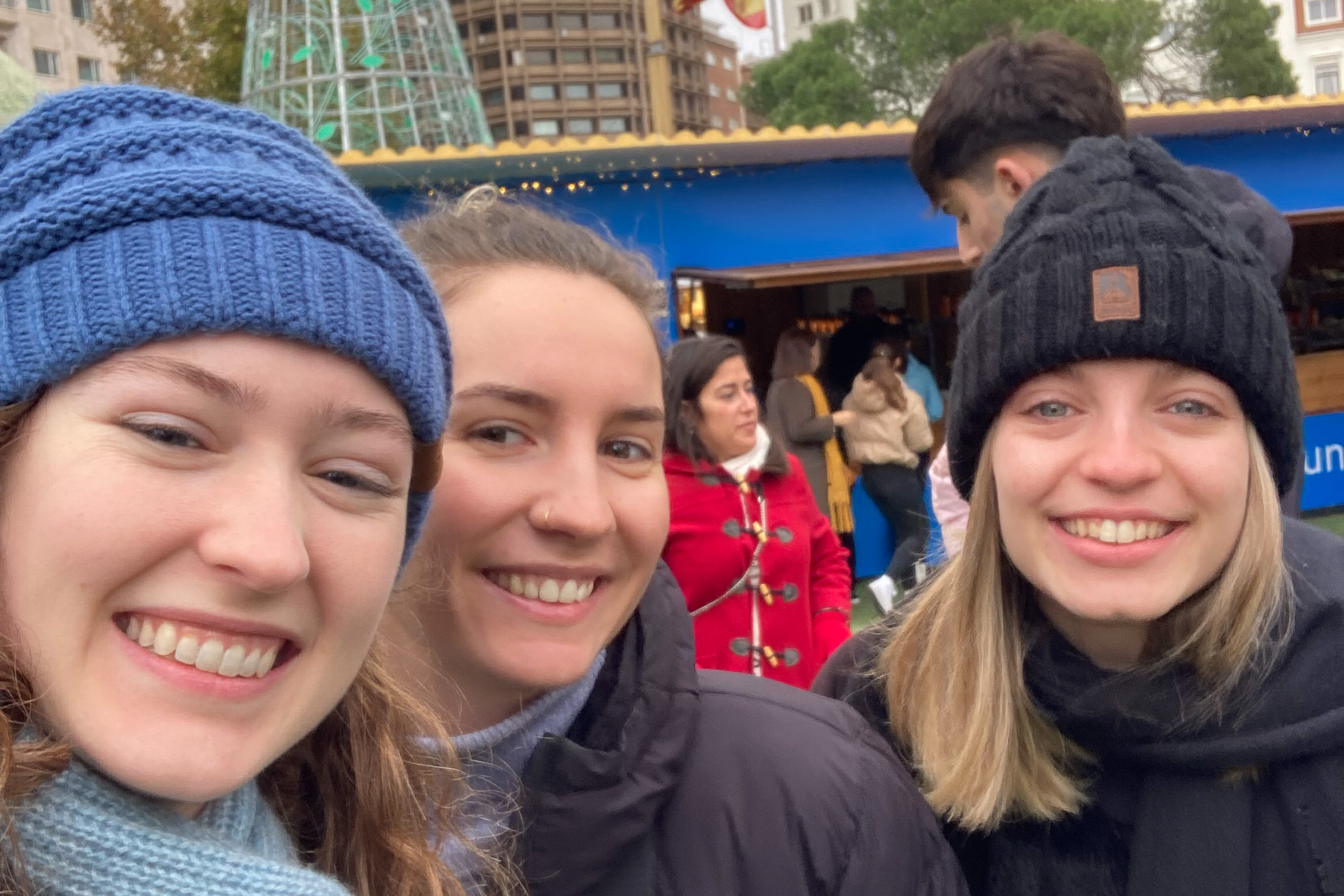Connecting Deeply in Madrid: Q&A With an 11-Month Intern
After graduating from Berry College in 2023, Emily Lanclos decided to take a gap year serving with MTW’s team in Madrid before attending law school. During her 11 months in Spain, she was able to connect deeply and plant gospel seeds with three non-Christian women. MTW staff writer Chelsea Rollman recently sat down with Emily to talk with her about her internship experience. The following has been edited for clarity and brevity.
Q. How did God lead you to MTW’s internship in Madrid?A. I grew up in Georgia. I lived there my whole life, and I went to undergrad at Berry College in Rome, Georgia. I studied English, and in order to satisfy a humanities requirement I had to take a language. I started taking Spanish and realized I enjoyed it and was picking it up very quickly. It kind of morphed into a major.
I started working with the English as a Second Language Program that Berry ran for immigrants in the community. Throughout that time, the goal was always to go to law school. But junior year, I decided I didn't want to do that right away, if at all. I started looking for some other things to do and … then someone at my church said, “Hey, you should check out an MTW internship.”
I talked to a MTW recruiter who found out that I speak Spanish and put me in touch with the Burkempers [MTW team leaders in Madrid]. After one conversation with Jen Burkemper it was clear to me that that was what I wanted to do, at least for that next year. The Lord was clear on His leading in that. And it was kind of amazing how it clicked because I had been studying Spanish but wasn't sure if or how I would get to use it.
Q. What were your main ministry responsibilities?
A. One of the big things I did as an intern was teach ESL classes at the church in Madrid. The church had never had a program before, so I was starting it from ground zero, which was new for me because the program at Berry was very established. I was grateful for that experience because I had a working curriculum and ideas.
We did some advertising, making flyers and trying to get the word out. Some of our ESL students were connected to the church but some of them just saw the flyer or saw a Facebook post or different things like that. Then there was a lot of lesson planning on my end. We always ran a two-part class that was one hour of grammar and one hour of conversation. I would always teach the grammar and someone else on my team would do the conversation hour. We had two different levels—basic and advanced. While one group was doing grammar the other would be in conversation, and then they would swap. But it was definitely a challenge because our numbers would fluctuate a good bit. On days when there were just a few students, I would usually combine all the levels. Then it was like a one-room schoolhouse where I was teaching basic students and advanced students at once.
So there were English classes, and then Sundays were always busy with me doing something with the church like teaching children's church during the services or helping out with seasonal events. I remember they did a big fall event and a big Easter event.
I also led a Bible study that started after I had already met these girls and had spent a lot of time getting to know them, talking to them, and building trust with them. We had our first study in February 2024 and it ran through June 2024.
Q. How do the Spanish people view the Church? What is the spiritual climate in Madrid?
A. Spain as a country is very, very secular. At the same time … the Catholic Church is a huge presence. It would not be uncommon for someone to say, “I'm Catholic. I took my first communion, but I don't believe in God.”
There is also mistrust of all things church. There's a lot of history in Spain with associating the church with state control. I ran into that a lot in daily conversations. People wanted to know what I was doing there and I would often say, “Well, I work with a church,” because that's one of the easiest ways to explain what I was doing. People would very quickly react like, “I don't want any part of that,” because when they hear “church” they think the Spanish Catholic Church.
There is also a lot of misunderstanding. People had no clue what a Protestant church was and no idea that there was anything other than Catholicism. Sometimes we would be confused with Mormons. If you're not Catholic, it's like, “Oh, are you Mormon?”
So there are lots of misconceptions around who God is. And when you're walking down the street, you know that 99% of people you see are probably atheists or, at the very least, not following the Lord.
Q. You said you started a Bible study with some girls you met in Madrid. How did that begin?
A. One of my priorities the whole time I was there was to meet people my age and connect them to the permanent team. I met one of the girls in the study through an international Facebook group. She is actually Spanish and was in this international group because she wanted to meet internationals and practice her English. I hit it off with her quickly and we had a lot of coffee together and went on many walks.
I met a second girl through the first girl and started doing the same thing with her and hanging out with the two of them together.
The Burkempers connected me to a third girl. She studied abroad in the U.S. and her host family happened to be a pastor and his wife. They took her to church with them and she started asking a lot of questions about Christianity. When she returned to Spain, they connected her to Jamie Burkemper.
And so I spent a lot of time individually with these girls, and then proposed the idea of doing a Bible study to each of them separately. I called it an investigative study because it wasn't studying the Bible like I would do with a group of believers. It was very much an introduction for people who have never read the Bible before.
Q. What were some of the topics you covered during the study?
A. I mostly created my own content. I had some stuff in mind that I wanted to talk about based on conversations we had had and questions they had asked. But I wanted to start with the basics even if they hadn't specifically asked about basic things.
I think our first study was on “Who is Jesus?” We talked about what they thought about Him, what they thought they knew about Him, and then what the Bible says about Him.
We did a topic on “What is sin?” and “What is grace?” I remember having a really good discussion on sin and why certain things are a problem. We had a discussion on freedom and I was driving the discussion to be about Jesus freeing us from sin and from guilt and how that is true freedom. I remember getting some good questions like, “Why would sin be a burden?” or “Why should you feel guilt about that?”
Q. How familiar were they with the Christian faith and the gospel of Jesus?
A. They didn’t have the vocabulary for things, and that was one of the one of the challenges of leading this study. I had to lead it without the Christian vocabulary and that was something I knew was going to be hard [for me] going in. I prepared with that in mind. So while they might not have had certain vocabulary, they definitely understood the concept of things like a conscience.
Being in Spain, they knew that Catholics go to confession. We were able to have a very good discussion about why Protestants don't believe you need to go to confession. We pray directly in the throne room of God. That led to lots of open doors.
I remember starting off the week where we focused on the person of Jesus by asking them “Who do you think Jesus is? What do you think about Him?” I remember getting a very standard response from one girl who said, “Oh, I'm sure he was a good person who came and taught.” The most surprising response I got was from another girl who said that she didn't think of Him as a real person. She thought of Him as someone spiritual. So that was interesting to discuss and say, “Oh, well, Christians believe He was a human. He walked the earth in a body.” She didn't know that, so that was exciting to talk about.
They also knew the gospel story. They knew the Easter story a little bit because Easter is a huge holiday in Spain. I think they were skeptical that [the Resurrection] had actually happened.
Q. How did you see God working in everyone’s heart?
A. I never saw a conversion, but I was encouraged that they seemed so interested. We were talking about a lot that they had never heard before. Even with stuff that they had a concept about, they always seemed pleasantly surprised to hear it put differently and to hear it explained in a way that they'd never heard before. They each told me individually that they really loved the study and always looked forward to it, and we were able to continue conversations outside of them. So I think definitely the Holy Spirit was moving and seems like He still is. I know two of the girls, at least, are still in contact with the team.
I was always able to feel the Holy Spirit's presence as I was leading the study. I was nervous the first time I did it thinking, “I don't know how this is going to go. They're probably not going to come back.” But I could feel words coming to mind and grew to anticipate how the Holy Spirit would supply those words. As these girls were asking questions, the answers were just so easy and accessible. And I believe that was the Holy Spirit.
Q. What did God teach you about Himself, His work in the world, and His love for you through the internship?
A. I grew to anticipate His leading. I think He's broadened my understanding of what it means to rest in the in the works that He has already prepared for me beforehand. I remember coming to Madrid feeling pressure. I was like, “I'm here for a year. I really hope I see some fruit. I’d better work really hard.” But when I worry like that, I miss out on the security of God having already prepared the works for me to walk in.
Secondly, I grew in my understanding of God's grace. Just in the sense of, “Wow!” I need it so much more than I thought I did. I think I came to Spain with some misconceptions, even though I often give lip service to salvation by grace alone or my daily sanctification by grace alone. But really understanding that and living that out and knowing that God isn't blessing ministry work because I do it well. He's blessing it because He loves to bless.
Q. How did this experience impact your view of the Church and the world?
A. I definitely have so much of a broader understanding of the global Church and how God's Church breaks down barriers that seem so big and so insurmountable to us—whether they be cultural barriers or something else. Those barriers are not too big for God's Church. So I think it broadened my perspective of His sovereign plan for His Church.
God doesn't give up on any people groups. In a similar vein, these barriers that are apparent in a culture are just not too big for God to overcome.
I also have a better understanding of how amazing it is that in the U.S. we have such easy access to churches. Here in Arlington, there are so many church options for me and there are a lot of Christians around me. God has blessed me with a church community and with Christians at my law school. I think about the young adult Spanish Christians that I met in Madrid, and how they don't have that strong Christian community because there just aren't that many Christians living there.
Q. Any final thoughts or reflections on your internship?
A. I'm so grateful for the opportunities that came up while I was there that I wasn't expecting. One thing I got to do is work with a place called the Oasis Center, which is not connected to the MTW team. It's a separate Christian organization and their focus is helping immigrants in Madrid integrate into Spanish culture. They were also running ESL classes and they needed an extra teacher. I volunteered with them once a week and [helped run] some camps for kids over the summer and that was a big opportunity that I wasn't expecting. Running the camps was a lot of fun and it was amazing to witness a lot of these kids hearing the gospel for the first time.
I’m amazed how God brought up so many opportunities I wasn't expecting and so amazed at His provision throughout my year.
Q. Would you recommend an MTW internship and what advice would you give to someone preparing to serve?
A. Yes, I would recommend it to anyone—my age or not. But I think it was especially valuable for me to go after graduating from undergrad and before starting law school. I think it's changed my perspective. Starting law school after doing a year of missions kind of makes law school not as big of a deal as some people think it is.
I think I would say go with a very humble and open mind. Be ready to receive all the things that God can teach you because He taught me a ton.
Interested in serving on a 1-11-month internship? Visit mtw.org/1-11-months to get started.
GET INVOLVED
Pandemia y Prayer in Madrid
MTW Missionary Roberto Tanzie reflects on the pandemic in Madrid and how Spain got to this point.
SEE MOREWinning Spanish Hearts and Minds: Bringing the Gospel Where the Church is Despised
Here in this deeply secular, post-Christian environment, MTW’s Madrid team works to bring the hope of the true gospel of grace to the city.
SEE MOREMy Critical Breakfast Guest
Over breakfast she criticized the meal, our home, and my hair. I didn’t want to invite her back. In that moment my heart was revealed.
SEE MOREPray for Spaniards in Madrid, a deeply secular, post-Christian environment where the Church is despised due to past atrocities.
SPAIN: Pray that the Holy Spirit would bring spiritual depth and numerical growth to the Principe Pio and Sanchinarro church plants in Madrid.
Pray for missionaries seeking to minister to those who are critical and hard to love. Pray that missionaries would love their neighbor as Christ loved us.
Give thanks to God for a movement of the Spirit spreading across Europe opening doors that have been long-shut.
Pray for the declining Church in Europe. Many see Europe as post-Christian and without hope. But we know that Christ will build His church.
Pray for Europeans who have heard the gospel but are hesitant to fully commit to Christ. Pray that God would draw them to Himself.
Pray for the MTW Spain teams as they face cultural challenges of ministering to the older generation with a faith built on fear, and a younger generation disinterested in God.
Pray for two women, Monika and Andrea, who have recently come to faith against the odds in a hard-to-reach, largely atheistic European city.
Pray for Monika, that God would continue to heal her, give her a new purpose, and protect her life from physical harm, and for Andrea, that she would grow deep roots of faith and be a witness to those like her—unlikely subjects—of the reality of the grace of God.
Pray for Bogomil, who came to faith in Christ out of antagonistic atheism, and for others like him who have yet to embrace Jesus.
Pray our the church revitalization efforts in England and Scotland as MTW missionaries come alongside UK national pastors to strengthen their efforts.
SUBSCRIBE TO STORIES & MORE
Good news in your inbox, once per week.
1600 North Brown Rd
Lawrenceville, GA 30043
United States
1-678-823-0004
[email protected]
Donor Advised Fund Portal
Circle Portal


